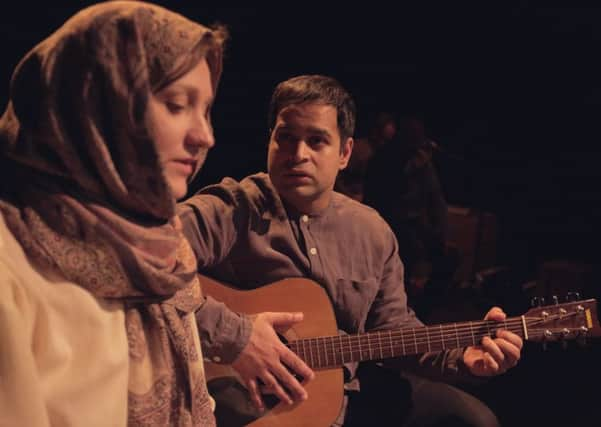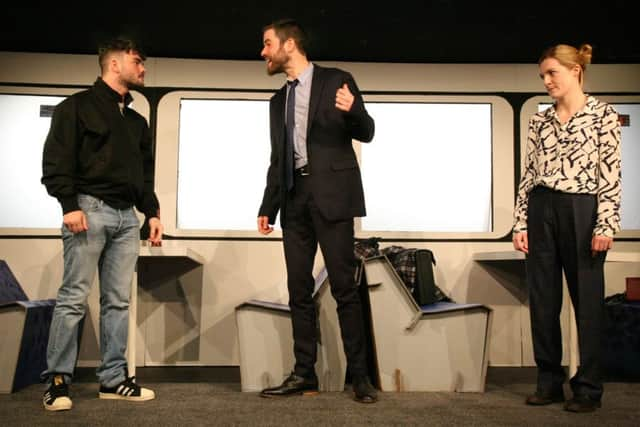Theatre reviews: Do Not Press This Button, Oran Mor, Glasgow | Alex And Eliza, Traverse Theatre, Edinburgh


Do Not Press This Button, Oran Mor, Glasgow **** | Alex And Eliza, Traverse Theatre, Edinburgh ***
Their names are Maria and Ben, powerfully played by Gemma McElhinney and David Rankine; and if their looks are slightly deceptive, then the conversation that erupts between them, once Maria agrees to chat, is even more disconcerting. “What’s your favourite race?” asks Maria; and in seconds, Bissett’s clever and tightly-constructed 45-minute pay is spiralling off into profoundly uncomfortable territory, only to become even more disturbing when Ben and Maria are joined by a third character, a cheery working-class guy called Terry (Cameron Fulton) who – as he points out – is only minding his own business, until they start inquiring into his attitudes, and poking at his prejudices.
Advertisement
Hide AdShaking up smug liberal assumptions is all the rage among some Scottish-based male playwrights at the moment: David Ireland does it hilariously and compulsively, Douglas Maxwell has had a go at it in plays like Promises Promises and The Whip Hand, and now Bissett is in the same territory, raising deeply uncomfortable questions about the superficiality of politically-correct attitudes to race, and about how liberal views on race and sexuality interact with issues of class, in ways that leave our society ever more divided. And while plays that set out on this route often seem to end up on a mission of despair – not so much challenging hypocrisy where it clearly exists, as hinting that liberal values themselves are mere idealistic nonsense – there’s no doubting the troubling skill with which Bissett raises the questions here, the smart sensitivity of Kirstin McLean’s direction, or the sheer power of McElhinney’s performance as Maria, the woman who presses the conversational button that says do not press, and opens a Pandora’s box of hatred, intolerance and violence.


There’s no clever questioning of liberal values in Umar Butt’s gentle family history play Alex & Eliza, by contrast; perhaps because a story of profound and loving interaction between different and opposing cultures, even in some of history’s darkest moments, is written into the very fact of Butt’s existence. Performed by Butt himself with actors Severina Dudzynska and Danny Charles and musician Laura Stutter, Alex & Eliza tells the story of Butt’s grandparents, who met in northern India just before the horror of partition in 1947 began to tear the country apart.
Eliza was white, the daughter of a British soldier and a young and beautiful missionary who died in childbirth; Alex – so renamed by Eliza’s English Dad – was a young Sikh paratrooper from Bengal who ended up at their door near Agra after a failed wartime parachute jump, and joined the family after falling in love with the sound of Eliza’s singing voice. And when, 75 years on, the aged and dying Eliza arrives in Glasgow to visit her grandson, she finds herself finally passing on the story that has always remained untold; of how she and Alex fled the horror of genocide, found safety in Pakistan, converted to Islam, changed their names, and never again mentioned their Sikh and Christian origins.
Directed by Butt himself, who also appears on stage, this gentle 90-minute show – produced at ARC in Stockton-on-Tees – often slightly lacks pace and dynamism, despite the riveting quality of the story it tells. It has two or three false endings, and a slight tendency to repeat itself, not least in the sub-plot of Umar’s friendship with an elderly Afro-Caribbean drifter in Glasgow; and the music only really works when Eliza is singing, hauntingly, to the sound of an old harmonium.
Yet Eliza’s story of flight, love and survival carries such a weight of significance for our time, with such grace and gentleness, that the show remains irresistible, and profoundly moving; far from perfect, but much more important than many a show with greater polish and a harder heart.
JOYCE MCMILLAN